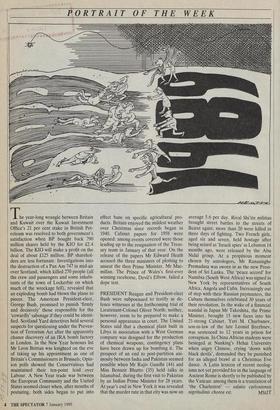PORTRAIT OF THE WEEK
The year-long wrangle between Britain and Kuwait over the Kuwait Investment Office's 21 per cent stake in British Pet- roleum was resolved to both government's satisfaction when BP bought back 790 million shares held by the KIO for £2.4 billion. The KIO will make a profit on the deal of about £125 million. BP sharehol- ders are less fortunate. Investigations into the destruction of a Pan Am 747 in mid-air over Scotland, which killed 270 people (all the crew and passengers and some inhabi- tants of the town of Lockerbie on which much of the wreckage fell), revealed that an exploding bomb had blown the plane to pieces. The American President-elect, George Bush, promised to punish 'firmly and decisively' those responsible for the `cowardly' sabotage if they could be identi- fied. Scotland Yard detectives held several suspects for questioning under the Preven- tion of Terrorism Act after the apparently chance discovery of an IRA bomb factory in London. In the New Year honours list Mr Leon Brittan was knighted on the eve of taking up his appointment as one of Britain's Commissioners in Brussels; Opin- ion polls showed the Conservatives had maintained their ten-point lead over Labour. A New Year trade war between the European Community and the United States seemed closer when, after months of posturing, both sides began to put into effect bans on specific agricultural pro- ducts. Britain enjoyed the mildest weather over Christmas since records began in 1940. Cabinet papers for 1958 were opened: among events covered were those leading up to the resignation of the Treas- ury team in January of that year. On the release of the papers Mr Edward Heath accused the three ministers of plotting to unseat the then Prime Minister, Mr Mac- millan. The Prince of Wales's first-ever winning racehorse, Devil's Elbow, failed a dope test.
PRESIDENT Reagan and President-elect Bush were subpoenaed to testify as de- fence witnesses at the forthcoming trial of Lieutenant-Colonel Oliver North; neither, however, seem to be prepared to make a personal appearance in court. The United States said that a chemical plant built in Libya in association with a West German company was designed for the production of chemical weapons; contingency plans have been drawn up for bombing it. The prospect of an end to post-partition ani- mosity between India and Pakistan seemed possible when Mr Rajiv Gandhi (44) and Miss Benazir Bhutto (35) held talks in Islamabad, during the first visit to Pakistan by an Indian Prime Minister for 28 years. At year's end in New York it was revealed that the murder rate in that city was now an average 5.6 per day. Rival Shi'ite militias brought street battles to the streets of Beirut again; more than 20 were killed in three days of fighting. Two French girls, aged six and seven, held hostage after being seized as 'Israeli spies' in Lebanon 14 months ago, were released by the Abu Nidal group. At a propitious moment chosen by astrologers, Mr Ranasinghe Premadasa was sworn in as the new Presi- dent of Sri Lanka. The 'peace accord' for Namibia (South West Africa) was signed in New York by representatives of South Africa, Angola and Cuba. Increasingly out of step with their Russian paymasters, the Cubans themselves celebrated 30 years of their revolution. In the wake of a financial scandal in Japan Mr Takeshita, the Prime Minister, brought 15 new faces into his 21-strong Cabinet. Yuri M. Churbanov, son-in-law of the late Leonid Brezhnev, was sentenced to 12 years in prison for corruption. In China African students were besieged at Nanking's Hehai University when angry Chinese, crying 'down with black devils', demanded they be punished for an alleged brawl at a Christmas Eve dance. A Latin lexicon of recent neolog- isms not yet provided for in the language of Ancient Rome is shortly to be published by the Vatican: among them is a translation of `the Charleston' — salatio carloniensis nigritudinis chorea est. MStJT










































 Previous page
Previous page